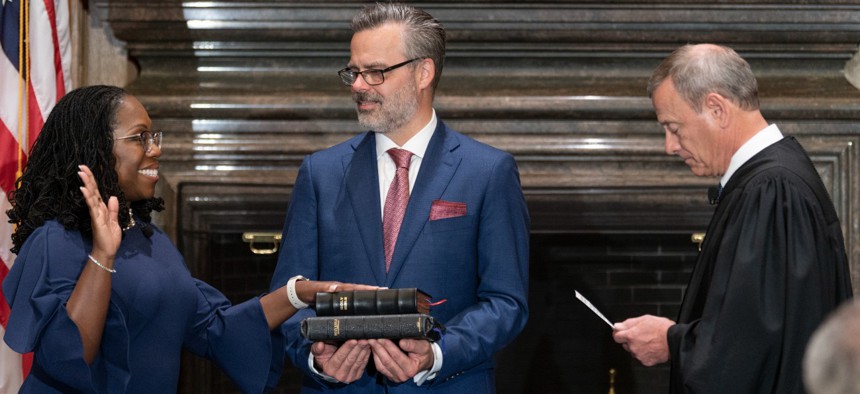
Chief Justice John G. Roberts Jr. (right) administers the Constitutional Oath to Judge Ketanji Brown Jackson in the West Conference Room of the Supreme Court on June 30, 2022 in Washington, D.C. Jackson was sworn in as the newest Supreme Court Justice on Thursday, replacing the now-retired Justice Stephen G. Breyer. Fred Schilling/Collection of the Supreme Court of the United States via Getty Images
Ketanji Brown Jackson, A Defender of Federal Union Rights, is Now A Supreme Court Justice
The first Black woman to serve on the nation’s highest court once sided with federal employee unions in a legal challenge against the Trump administration.
Ketanji Brown Jackson was sworn in Thursday as the newest Supreme Court justice, filling the retiring Justice Stephen Breyer’s seat on the bench.
Jackson, 51, was confirmed by a 53-47 vote in the Senate in April but had to wait until the end of the court’s latest term to join the bench. Until Thursday, she served as a judge on the U.S. Court of Appeals for the D.C. Circuit, and was the first Black woman nominated to serve on the high court.
Prior to joining the appeals court, Jackson was a judge on the U.S. District Court for the District of Columbia, a public defender, and a clerk for Breyer. She is a graduate of Harvard College and Harvard Law School.
Jackson’s jurisprudence may be familiar to many federal workers. During her time as a District Court judge, she issued a key ruling in favor of federal employee unions during their fight against a series of Trump administration executive orders aimed at making it easier to fire federal workers and reduce the role of unions at agencies.
The executive orders, signed in May 2018, collectively reduced barriers to terminate federal employees, restricted the scope of collective bargaining and “streamlined” the union contract negotiation process, and significantly reduced the amount of time union representatives could spend on official time.
In her decision, Jackson concluded that the executive orders conflicted with the 1978 Civil Service Reform Act, because they disregarded Congress’ conclusion, as stated in the law, that good faith labor-management relations are “in the public interest” and improperly “eviscerated” federal employees’ collective bargaining rights.
"As to the merits of the unions’ contentions, while past precedents and pertinent statutory language indicate that the president has the authority to issue executive orders that carry the force of law with respect to federal labor relations, it is undisputed that no such orders can operate to eviscerate the right to bargain collectively as envisioned in the [statute]," she wrote. "In this Court’s view, the challenged provisions of the executive orders at issue have that cumulative effect."
But after the Trump administration appealed the ruling, a three-judge panel reversed the decision on procedural grounds in 2019, finding that unions must first challenge concrete examples of agencies implementing the executive orders before the Federal Labor Relations Authority. Once President Biden took office in 2021, he rescinded the edicts and expanded agencies’ union bargaining obligations to include permissive, non-mandatory subjects.
Unions have since urged the Supreme Court to review Thunder Basin Coal Co. v. Reich’s “channeling” doctrine, which was at the heart of the appeals court’s reversal of Jackson’s ruling, because they said that lower courts have applied the concept inconsistently.







